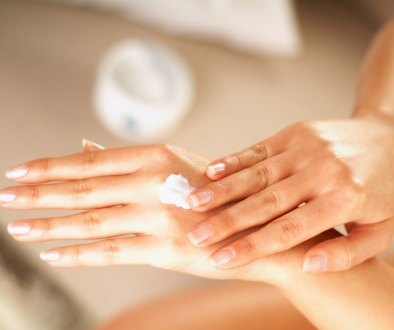Sleep Patterns and Weight-Loss
Are your sleep patterns sabotaging your weight-loss efforts?
So you’re hitting the gym on the regular and filling your plate up with all the right foods – but how are you sleeping?
We all know the benefits of a good night’s sleep, most notably that feeling of waking up alert, refreshed, and rejuvenated! Unfortunately, quality sleep doesn’t always come easily. How many times have you found yourself awake in the wee hours of the morning, tossing and turning, willing yourself to just go to sleep already? Well you’re not alone. I used to suffer from terrible insomnia, often lying in bed running through my “to-do” list, stressing about upcoming deadlines, and doing the dreaded “sleep math”. You know what I’m talking about – the old “if I go to sleep RIGHT NOW I’ll still get x hours of sleep.”
 Not only does poor quality sleep affect your energy levels, your skin, and your general sense of well-being, but it can also be sabotaging your weight-loss efforts. More often than not people fail to make the connection between good sleep habits and weight-loss, but quality sleep is a vital component of any successful weight-loss endeavor. In a recent study, researchers identified two hormones, leptin and ghrelin, as having a major influence on appetite, fat storage, and cravings. Ghrelin, which is produced in the gastrointestinal tract, stimulates appetite, while leptin, produced in fat cells, sends a signal to the brain when you are full. When you don’t get enough quality sleep, leptin levels drop, which means you don’t feel as satisfied after you eat. Lack of sleep also causes ghrelin levels to rise, which means your appetite is stimulated and you want more food. These two factors combined can set the stage for overeating and cravings – a situation that is hardly conducive to losing those unwanted pounds!
Not only does poor quality sleep affect your energy levels, your skin, and your general sense of well-being, but it can also be sabotaging your weight-loss efforts. More often than not people fail to make the connection between good sleep habits and weight-loss, but quality sleep is a vital component of any successful weight-loss endeavor. In a recent study, researchers identified two hormones, leptin and ghrelin, as having a major influence on appetite, fat storage, and cravings. Ghrelin, which is produced in the gastrointestinal tract, stimulates appetite, while leptin, produced in fat cells, sends a signal to the brain when you are full. When you don’t get enough quality sleep, leptin levels drop, which means you don’t feel as satisfied after you eat. Lack of sleep also causes ghrelin levels to rise, which means your appetite is stimulated and you want more food. These two factors combined can set the stage for overeating and cravings – a situation that is hardly conducive to losing those unwanted pounds!
But achieving quality sleep is possible by following a few guidelines. Here are a my top tips on how to wake up fresh-faced and ready to take on the day – instead of rolling out of bed looking like an extra from “Walking Dead”!
1. Ditch the Afternoon Coffee
We all hit that afternoon “wall” sometimes, often looking to a quick coffee (or any caffeinated beverage) for a much needed pick me up. But although caffeine provides you with a burst of energy by stimulating brain activity, this stimulation often carries over into sleep, disrupting normal sleep patterns and affecting the quality of sleep you’re getting. I’m not asking you to give up your morning coffee, but try and avoid consuming all caffeinated beverages less than five hours prior to bedtime.
2. Turn Out the Lights – ALL the Lights
Any light in the room can upset the release of melatonin, a hormone secreted from the pineal gland that triggers sleep. If there is any light in the bedroom (from the bathroom, outside street lights, or your alarm clock), it can interfere with melatonin secretion. If you must use a digital alarm clock, turn it away from the bed and invest in some pull-down blinds to make your room as dark as possible. Sleep masks are also a good option.
3. Lower the Temperature
For most, the ideal temperature for sleep is somewhere between 60 and 68 degrees F (or 16 to 20 degrees C). This is because a mild drop in body temperature induces sleep, and this is easier to achieve when you are in a cooler room. You might need to play around with the temperature to find what’s right for you, but try and set your thermostat to the right temperature a couple hours before bed to give your room time to cool down. If you don’t have control via a thermostat, try using a fan to help cool things off instead.
4. Avoid the “Blues”
Light, or the lack thereof, plays an enormous role in the regulation of our cycles, especially our sleep cycle. And it’s blue light specifically that appears to monitor our sleep patterns the most. When we are exposed to blue light, our bodies limit the production of melatonin, and we stay alert and awake; in the absence of blue light, melatonin production ramps up, and we get sleepy. During the day, blue light (natural or unnatural) isn’t a problem because we’re supposed to be awake. But at night, when we’re “supposed” to be getting ready to sleep, we tend to sit in front of blue light-emanating appliances (such as our cell phones, TVs, tablets, and computer screens) and our sleep suffers for it. Make a habit of “powering down” at least an hour or two before bedtime, turning off the computer and the television. Instead, use that fantastic brain of yours and read a good book! But try and avoid anything too intellectually stimulating (such as the newspaper), as this may create mental chatter that will keep you awake.
5. Establish a Sleep Schedule
Setting a specific sleep schedule can be difficult for some, but it truly works in helping you obtain a quality night’s sleep. Try and go to sleep and rise at the same time every day, ideally going to sleep no later than 10 p.m. Also (and you’re going to groan at this one), don’t sleep in on weekends! This will not only upset the routine you are trying to establish, but the sleep you get before midnight is much more valuable than the sleep you get after. If you need more sleep, it is better to go to bed early the next night.
6. Improve Your CAR (Cortisol Awakening Response)
When we wake in the morning our bodies experience a spike in cortisol levels that energize us and bring about feelings of wakefulness. The more we strengthen this occurrence, the better we sleep, since feeling more awake in the morning means feeling more tired at night!
One easy way to do this is to expose yourself to sunlight first thing in the morning, even if it’s just a quick 10 minutes. If you are lacking for natural sunlight, a sun lamp is an excellent alternative, and, like the real thing, it offers an excellent dose of vitamin D, which helps boost mood and improve overall health. It may also be helpful to take a vitamin D supplement in the morning.
7. Say Hello to Tryptophan and Calcium
Tryptophan is a precursor to the brain chemical serotonin, which triggers proper melatonin release. Calcium has a calming and relaxing effect on the body that helps ease you into a proper and deep night’s sleep. Take advantage of these natural sleep aids by incorporating them into your daily diet. Not sure there to find these magical sleep inducing ingredients? Common foods like turkey, organic plain yogurt, spinach, and kale are great places to start.
8. Sssshhhh! Quiet Please.
This can be hard with family, significant others, or roommates in the picture, but exposure to noise makes it hard not only to drift off, but it also affects the quality of the sleep itself. Outside traffic noise, sounds from the TV downstairs, or a housemate talking too loudly on the phone – all saboteurs of a good night’s sleep. If the problem is other members of the household, simply asking them to keep it down will work for you. If the issue is environmental noise, then you may want to try incorporating white noise into your sleep routine. White noise effectively blocks out other noise while also giving your brain enough sensory stimulus not to wake up at the slightest sound. Your white noise can be as simple as the sound of a fan, or you can go the techier route and try a sound machine. Whatever lulls you into a gentle and restful sleep!
9. Start Journaling
You may already be keeping a food, exercise, and mood journal (if so, good for you!), but studies show that writing about your day’s events and listing things for which you are grateful right before bed has a calming and peaceful effect on the mind. So take 15 minutes before bed to record your goals, dreams, and any positive thoughts and drift into a happy sleep!
10. Invest in a Quality Mattress
A quality bed is one of the best investments you’ll ever make. After all, you sleep in it every night, don’t you? And it doesn’t have to break the bank. In fact, some say that the fancy Tempurpedic mattresses can actually negatively affect sleep by forming to your body and thus increasing body temperature. If you’re not already sleeping on a quality mattress, get one! If you can’t afford a new mattress at the moment, start saving for one today by setting aside $50 – 100 per month to buy a new one. Trust me – it’s worth it!
I can’t promise that following these guidelines will ensure a Disney style morning, waking up with a happy song on your lips while birds help you bathe and dress. But I can guarantee that by incorporating these changes into your sleep routine, you will wake feeling more like the best version of yourself – and not your zombie doppelganger!



